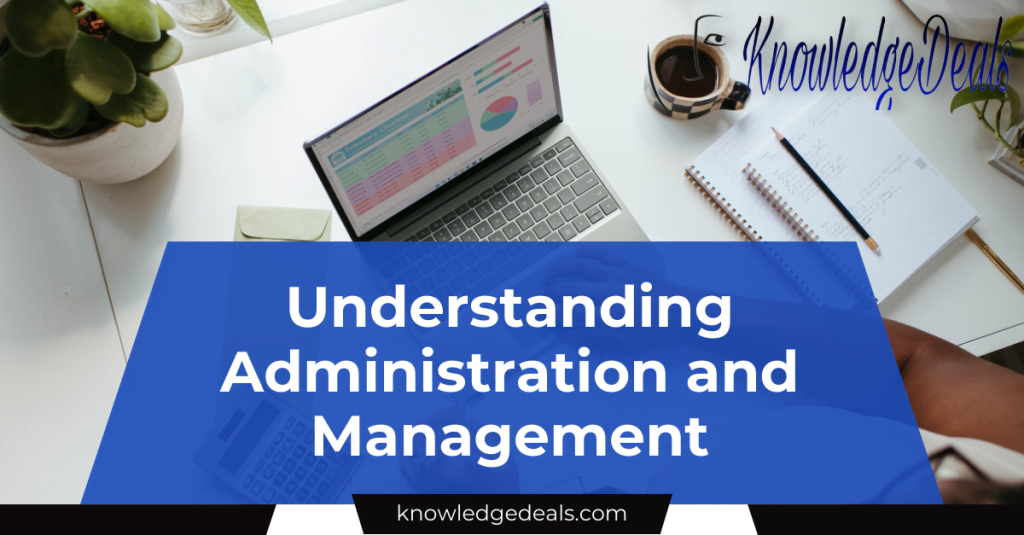[ad_1]
In this article, we will explore the fundamentals of administration and management, including the key differences between the two, their roles and responsibilities, and the impact they have on organizations. We will also discuss the qualities of effective administrators and managers, as well as the importance of effective communication and decision-making in these roles.
What is the difference between administration and management?
Administration and management are often used interchangeably, but they actually refer to distinct functions within an organization. Administration involves setting objectives, policies, and procedures, while management involves implementing these strategies to achieve organizational goals.
Administrators typically focus on long-term planning and decision-making, while managers are more concerned with day-to-day operations and ensuring that tasks are completed efficiently and effectively.
What are the roles and responsibilities of administrators and managers?
Administrators are responsible for establishing organizational goals, policies, and procedures, as well as overseeing the allocation of resources and evaluating the overall performance of the organization. They also play a key role in developing and maintaining relationships with external stakeholders such as customers, suppliers, and government agencies.
Managers, on the other hand, are responsible for supervising employees, coordinating work schedules, and ensuring that tasks are completed on time and within budget. They also play a crucial role in motivating and supporting their teams, as well as resolving conflicts and addressing performance issues.
What qualities make an effective administrator or manager?
Effective administrators and managers possess a range of key qualities, including strong leadership skills, excellent communication and interpersonal abilities, and the ability to make sound decisions under pressure. They are also able to adapt to changing circumstances, prioritize tasks effectively, and delegate responsibilities appropriately.
Furthermore, effective administrators and managers are able to inspire trust and confidence in their teams, while also holding them accountable for their performance and behavior. They are able to set clear goals and expectations, and provide the necessary support and resources to help their teams succeed.
Why is effective communication and decision-making crucial in administration and management?
Effective communication is essential in administration and management, as it facilitates the exchange of information, the coordination of activities, and the resolution of conflicts. Clear, concise communication ensures that everyone understands their roles and responsibilities, as well as the expectations and objectives of the organization.
Similarly, effective decision-making is crucial in administration and management, as it allows leaders to evaluate options, assess risks, and implement strategies that align with the organization’s goals and values. Good decision-making also inspires confidence and commitment from employees, and contributes to the overall success of the organization.
Conclusion
Administration and management are essential functions within any organization, and they play a crucial role in driving organizational success and growth. By understanding the key differences between administration and management, as well as the roles, responsibilities, and qualities of effective administrators and managers, individuals can develop the skills and knowledge necessary to excel in these critical roles.
FAQs
1. What is the main difference between administration and management?
While administration focuses on setting objectives, policies, and long-term planning, management is more concerned with implementing strategies and overseeing day-to-day operations.
2. What qualities make an effective administrator or manager?
Effective administrators and managers possess strong leadership skills, excellent communication and interpersonal abilities, and the ability to make sound decisions under pressure. They are also able to adapt to changing circumstances, prioritize tasks effectively, and delegate responsibilities appropriately.
3. How important is effective communication in administration and management?
Effective communication is crucial in administration and management, as it facilitates the exchange of information, the coordination of activities, and the resolution of conflicts. Clear, concise communication ensures that everyone understands their roles and responsibilities, as well as the expectations and objectives of the organization.
4. What are the responsibilities of administrators and managers?
Administrators are responsible for setting organizational goals, policies, and procedures, as well as overseeing resource allocation and evaluating overall performance. Managers are responsible for supervising employees, coordinating work schedules, and ensuring tasks are completed on time and within budget.
5. Why is effective decision-making crucial in administration and management?
Effective decision-making allows leaders to evaluate options, assess risks, and implement strategies that align with the organization’s goals and values. Good decision-making also inspires confidence and commitment from employees, and contributes to the overall success of the organization.
[ad_2]





